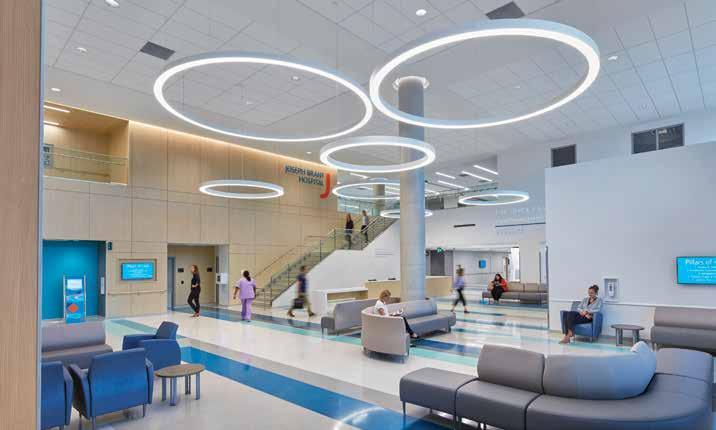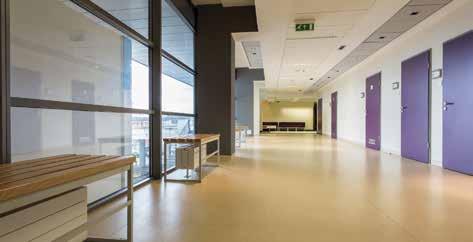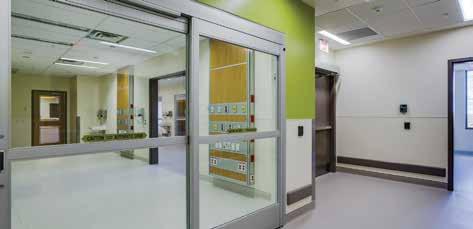
15 minute read
Chapter Reports
from CHF Summer 2020
by MediaEdge
Summer brought a different type of wave this year: COVID-19. Its spread has taken many countries by surprise and placed enormous stress on healthcare systems. Modifications have been made at a rapid pace to accommodate a new type of patient and protect the workforce, with innovative solutions coming from facility managers. Many individuals had to rely on internal resources and their own knowledge.
The Quebec chapter held its first event of 2020 in February, at McGill University Health Centre’s Glen site. It included a tour of the mechanical rooms followed by a conference on legionella in the hospital water network. The event was a huge success with more than 70 people in attendance, including Ontario chapter chair Jim McArthur whose presence was valued. We’d like to increase interactions with other chapters on a national level, as well as bring local healthcare facility communities together.
Advertisement
As the industry moves to new building layouts and solutions to cohabit with the presence of the coronavirus, the Quebec chapter will host a variety of informative webinars in the coming weeks. We will continue to monitor the situation closely across the province and adapt our offerings accordingly. Check the Quebec chapter page on the CHES website regularly and follow us on social media to stay up-to-date.
—Mohamed Merheb, Quebec chapter president
CHAPITRE DU QUEBEC
L’été 2020 nous a apporté un nouveau type de vague: la COVID-19. Sa propagation a pris de nombreux pays par surprise et a imposé une pression énorme sur les systèmes de santé. On s’est rapidement adapté pour accueillir un nouveau type de patients et protéger la main-d’œuvre; les gestionnaires d’installations ont proposé des solutions innovantes à cet effet.
La section québécoise a tenu sa première activité de 2020 en février, sur le site Glen du Centre universitaire de santé McGill. Elle consistait en une visite des salles mécaniques, suivie d’une conférence sur la legionella dans le réseau d’eau de l’hôpital. Ce fut un énorme succès : plus de 70 personnes y ont participé, dont le président de la section ontarienne, Jim McArthur. Sa présence a été appréciée. D’ailleurs, nous aimerions accroître nos interactions avec les autres sections et rassembler les communautés régionales des installations en soins de santé.
Alors que le secteur adopte de nouvelles solutions et de nouveaux aménagements afin de pouvoir cohabiter avec le coronavirus, la section québécoise organisera divers webinaires au cours des prochaines semaines. Nous suivrons de près la situation dans toute la province afin d’adapter nos offres en conséquence. Pour rester à jour, consultez régulièrement la page de la section québécoise sur le site web de la SCISS et suivez-nous sur les réseaux sociaux. After the stress and uncertainty of the last several months, I am sure we all deserve some relaxation this summer. Remember, safety should still be the number one priority. I am fortunate to be the facilities maintenance and engineering manager at the Peter Lougheed Centre in Calgary. The Alberta government has announced the hospital will undertake capital upgrades. These projects are the only ones slated in the province for the near future. The plans include a new medical device reprocessing department suite, emergency room expansion, rapid response laboratory and mental health short stay expansion. We are going to be busy at my site.
The chapter executive is looking to establish a bursary program at the Northern Alberta Institute of Technology, similar to what is provided at the Southern Alberta Institute of Technology. Supporting continuing education has been a very rewarding endeavour.
CHES Alberta hosted its first virtual annual general meeting on June 15. I’d like to thank the events management team for helping coordinate the meeting to ensure it was a success.
—Dan Ballantine, Alberta chapter chair
NEWFOUNDLAND & LABRADOR CHAPTER
The first half of 2020 has been challenging. After being pounded by a major winter snowstorm that forced a state of emergency, the pandemic hit. Transitioning facilities for an expected influx of COVID-19 patients, constructing drive-thru clinics in multiple locations, and dividing staff and implementing rotating shifts are just a few things that have kept healthcare staff busy. Throughout this pandemic, we have seen time and again the importance of our work.
On behalf of the chapter, I would like to express my gratitude to, and appreciation for, our frontline facilities management staff and management team. The amount of work completed (in many instances with skeleton crews) has been remarkable. Where would we be without everyone pulling together for the common goal? I cannot thank you enough.
As a province, like many others, we are currently in an economic low, primarily as a result of COVID-19. But even prior to the pandemic, our provincial financial picture was bleak. The number of residential and commercial new builds is at a minimum, oil and gas projects are on pause, offshore drilling is at a standstill and almost all industries have seen a decline. As we anxiously await a federal stimulus program, the province chugs along at status quo. All economic predictions indicate this will continue for the next few years. For this reason, it is challenging for people to find funding to partake in such voluntary groups as CHES. Nevertheless, the chapter is pushing recruitment of vendors/suppliers, consultants and other healthcare dependents to improve membership enrolment.
The chapter is sitting in a solid financial position. We are looking at creative ways of spending a portion of our funding, which includes investing in the continual learning for members through sponsorships, conferences and/or educational reimbursements.
After much deliberation involving all key stakeholders, the CHES National executive, board of directors and conference planning committee, we made the very difficult and unprecedented decision to postpone the 2020 CHES National Conference in Halifax to a future date beyond this year. Despite maintaining hope that we would be able to host the event, both the current pandemic state of the nation and future indicators do not bode well for a conference of this scale in 2020. We unanimously agreed healthcare will continue to have significant COVID-19 related challenges well into fall and we need to focus all resources and energy to that end. As a result of this decision, there are numerous actions CHES National is undertaking with Halifax exhibitors, delegates and sponsors and the conference planning committee. Our goal is to minimize everyone’s inconvenience as part of formalizing this year’s cancellation, while hopefully concurrently starting to lay the foundation for our conference next year.
CHES Maritime’s fall education day is in the planning stage as the new norm for 2020 may be webinars. Stay tuned for speaker topics.
The chapter is pleased to offer the Per Paasche bursary again this year. The $1,000 grant is open to all immediate family members of Maritime CHES members who are in good standing. The eligible person must be in a recognized program at a post-secondary education institute, such as a trade/vocational school, college or university. Although any career path is acceptable, preference is given to programs that could lead to a future career in healthcare facilities management, maintenance, operations or support. Applications for this year's bursary closed June 30.
CHES Maritime is able to balance the books while offering several financial incentives to its members in the way of student bursaries, contributions to Canadian Certified Healthcare Facility Manager (CCHFM) exam fees, webinars, the fall education day and other rebates.
—Helen Comeau, Maritime chapter chair
SASKATCHEWAN CHAPTER
It’s hard to believe we’re already halfway through 2020. It seems like yesterday we were making plans to host the 2019 CHES National Conference. Our annual general meeting was held on the last day of the event, with approximately 20 members in attendance. The Member of the Year award went to Steve Kemp who has been involved in electrical consulting engineering on many healthcare and technically challenging projects over the past 24 years. Steve has been a CHES member for 17 years. He serves on the Saskatchewan chapter’s board of directors and sits on CHES’s partnership and advocacy committee.
This year’s chapter conference has been cancelled due to COVID-19. It was to be held at the Delta Hotel in Regina, Oct. 19-20. For only the second time in the chapter’s history, our conference has been disrupted. The first was in 1989, due to labour unrest. This year it was cancelled because of COVID-19. In lieu of our in-person annual general meeting, an e-mail was sent to members in June with reports and the budget set with a proxy vote. The conference committee will begin planning for the 2021 conference in Penticton, B.C.
I would like to welcome Fraser Health Authority project manager Doug Davis to the chapter executive. Doug will serve in the role of secretary. He joins treasurer Rick Molnar, vice-chair Sarah Thorn, past chair Steve McEwan and myself as chair. Continuing in their current roles are Arthur Buse (membership), Mark Swain (communications), Mitch Weimer (public relations) and Caroline Reid (education). I would like to thank Ken Van Aalst for his years of service as treasurer and secretary. His calmness and guidance will be missed on the executive. We look forward to having Ken continue as an active CHES B.C. member.
As the province continues to recover from harm caused by COVID-19, I encourage everyone to take advantage of the webinars that continue to be offered at no cost to chapter members. Additional webinars have been added with discussions on experiences and new practices that have been implemented during the pandemic. This is a great opportunity to learn and ask questions from respected CHES members from across Canada, including B.C.’s Mitch Weimer and Steve McEwan.
—Norbert Fischer, British Columbia chapter chair
TORONTO, CANADA SEPTEMBER 17-21, 2022
27 TH CONGRESS OF THE INTERNATIONAL FEDERATION OF HEALTHCARE ENGINEERING
Learn more at:
www.IFHE2022.org
ONTARIO CHAPTER
Normally at this time of year, I would be reporting on the success of our spring conference. Unfortunately, a deadly virus showed up in early March, which not only caused the cancellation of our event in Windsor, Ont., but all CHES conferences across the country. The pandemic has presented many challenges to our members and their respective facilities. While it has been (and still is) a trying time for healthcare, the greatest consequence of this health crisis has been the loss of life. My thoughts go out to all who have been affected by COVID-19.
Looking to the future, Ron Durocher is already assembling the planning team for next year’s conference in Niagara Falls, Ont., May 16-18. While the cancellation of this year’s event resulted in loss of revenue, the chapter is in good financial shape thanks to the success of previous conferences. We plan to try again for Windsor in 2023.
At this time, all in-person events are cancelled or postponed. Chapter executive meetings will be held by conference call until it is safe again to meet face-to-face.
CHES Ontario’s annual general meeting was June 19. Since the chapter is incorporated, there are additional requirements for holding a virtual meeting. This was sorted out in our bylaws at the AGM. Moving forward, all meetings can be completely virtual, when necessary.
Planning will continue for the 2020 International Federation of Healthcare Engineering (IFHE) Congress in Toronto. Our last scheduled meeting was cancelled due to COVID-19, as was our trip to Rome to attend this year’s IFHE Congress.
The chapter continues to provide bursaries to nine Ontario colleges. Three family bursaries are to be awarded this year.
I’d like to acknowledge the chapter executive for their work and participation on various committees, both nationally and regionally, and their continued dedication to CHES. Also, thank you to Steve Rees and Gordon Burrill for arranging and facilitating the CHES COVID-19 webinars. Hats off to all, including our frontline staff, for the hard work and long hours that have been required to keep our facilities as safe as possible during this pandemic.
—Jim McArthur, Ontario chapter chair
MANITOBA CHAPTER
The Manitoba chapter has experienced its share of challenges as we work through the new way of doing business more virtually amid the pandemic. We, like other CHES chapters, cancelled our 2020 conference and trade show. We look forward to meeting up again next year, albeit under much different circumstances than 2019. The 2021 Manitoba chapter spring conference is scheduled for May 3-4, at the Victoria Inn Hotel and Convention Centre in Winnipeg. The theme is, Construction and Renovations in Healthcare Facilities.
The need to reschedule the 2020 CHES National Conference in Halifax due to COVID-19 means the Manitoba chapter will host the event in 2023, as opposed to next year. Planning will continue in the near future.
Together with Red River College’s Building Efficiency Technology Access Centre, CHES Manitoba has submitted a request for funding of a study on COVID-19 Infection Prevention and Control: Assessment of Humidity and Temperature in LongTerm Care Homes for Seniors. More information to come once we receive results of our collative request.
The chapter has introduced two new awards to recognize individuals who excel in their line of work. The 2020 Facilities Management Award of Excellence goes to Bill Algeo of Health Sciences Centre Winnipeg. The recipient of this year’s Project Management Award of Excellence is Gary Dandeneau, regional director of capital planning and facilities management at the Interlake-Eastern Regional Health Authority. Congratulations to both on being the first awards recipients. I encourage our members to nominate candidates for next year.
Also new in 2020, the Manitoba chapter sponsored the Award for Power Engineering Technology at Red River College. The $1,000 bursary was presented to Eric Juskowa, a power engineering technology student who completed the first term of the program with a minimum 3.0 grade point average.
Just a reminder, the Canadian Certified Healthcare Facility Manager (CCHFM) designation is offered through CHES. Certification demonstrates you have the necessary education and experience, confirmed by an outside body, to qualify as an elite professional in the healthcare facilities field. The Manitoba chapter will cover the cost of the CCHFM selfassessment exam for members attempting it for the first time. If successful in passing, the chapter will pay to take the certification exam.
In support of continuing education, the chapter will pay for regular members to take part in this year’s CHES webinar series. Details are on the Manitoba chapter page of the CHES website, along with more information about our contribution to the CCHFM exams. 2020 was an election year for the chapter executive. Members include Brent Kolton (vice-chair), James Kim (treasurer), Troy Lycan (secretary), Barry Doran (membership), Craig Doerksen (member-at-large), Tom Still (past chair) and myself (chair).

The Building Blocks of Change

COVID-19 accelerates need for adaptable, flexible healthcare facilities
With COVID-19 now impacting every aspect of our healthcare systems, hospitals around the world are radically changing to meet the demands of future pandemics. From how to manage the sudden swell of patients arriving due to seasonally recurring viruses to which materials and cleaning processes work best to mitigate the spread of disease, everything from floor tiles to waiting rooms are being re-evaluated. But beyond patient flow and enhanced hygiene measures, even the physical structures are changing—and as we look ahead to what the future might hold, the need for flexible, adaptable spaces is largely guiding the way.
Jennifer Watson, Associate at RJC Engineers specializing in healthcare projects, has already witnessed the movement toward hospitals with more flexibility in their design, a trend she says began before COVID-19, but has been profoundly accelerated because of it.
“For a while now, hospitals have been moving in this direction—not necessarily in anticipation of a pandemic but for reasons like changing demographics and shifting patient needs,” she says. “For example, what if one day we needed fewer cancer beds and more maternity beds? Having adaptable, flexible spaces would allow for easy conversion and potentially help to allow for patient isolation in dangerous situations like what we are seeing today.”
BRINGING PLANS TO LIFE
To build a flexible, adaptable healthcare facility, Watson says a consistent grid layout forms the basis of the overall building structure. After the architectural team has completed the plans with input from the hospital as to future programming and general requirements, the structural
STRUCTURAL CHANGES WE ARE ALREADY SEEING:
1.

2.
3.
4. Flexible, adaptable hospital spaces Higher ceilings for better air flow Wider and/or single-direction corridors More single-patient rooms vs. multi-patient wards
engineers enable that vision, bringing the plans to full, operational life.
“The flexibility comes from setting the columns in a regular pattern so that the interior walls can move if need be,” she explains. “Stairwells and elevators go somewhere permanent, but the rooms and interior spaces can be played with. That way, if one day more patient beds are required, or fewer offices are needed, the conversion is easy.”

The other benefit, says Watson, is that when the next infectious disease pops up, the allowances to move things around are already in place. “Having the available space and the means to allow for programming changes is crucial,” she says. “By using a grid layout, that space can be temporary and reconverted to something else when there is no longer a need for it.”
OTHER TRENDS
Along with flexible, adaptable spaces, hospitals are changing in other ways too. Modern healthcare facilities today offer more single-patient rooms and fewer multi-patient wards. Additionally, Watson says the ceilings are getting higher and ceiling spaces are getting larger. “New hospitals are being built with more ceiling space for air circulation,” she observes. “Moving air and natural light have known health and wellness benefits, and, higher ceilings are more aesthetically pleasing.”
In terms of COVID-19’s direct impact on hospital layouts, Watson prophesies interior corridors and pathways will widen. “If we need to keep people moving in a single direction, spaces will widen” she says. “And of course, internally we’ll see more touchless technology in elevators and other systems.”
One thing, however, that likely won’t change when it comes to future hospitals is the building materials used to construct them. “Steel and concrete are here to stay,” Watson says. “I can’t imagine even a pandemic will change that.”
To learn more about RJC’s services, please visit www.rjc.ca or contact Jennifer Watson directly at Jwatson@rjc.ca.







